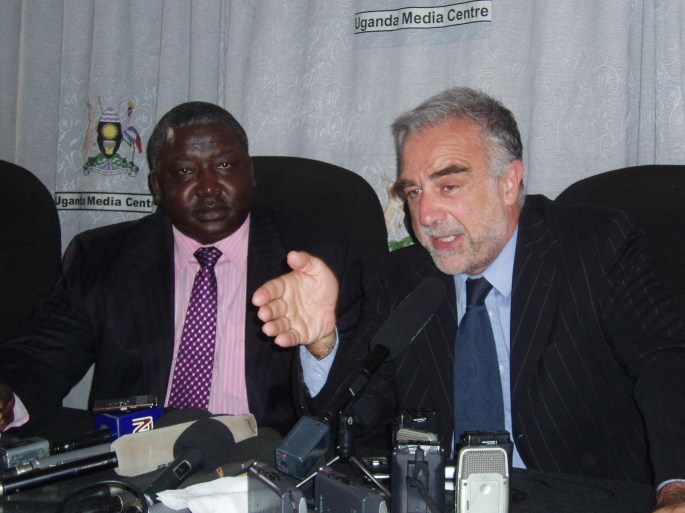The International Criminal Court Chief Prosecutor, Mr Luis Moreno-Ocampo, arrived in Uganda on Saturday to consult with government on the arrest warrants of Lords Resistance Army leaders and Sudanese President Omar al-Bashir. Minister for International Affairs also Henry Okello said Ocampo discussed with top government officials involved in international justice issues among others Jean Pierre Bemba’s case.

Much as the attention seems to be going to Gen. Bashir’s expected visit to Uganda on July 27 for the 2009 Smart Partnership Dialogue in Kampala, I dwelt on what the government stakes are as the Congolese ex-Vice-President Bemba, whom they supported for long, faces war crimes charges. The ICC ruled in June that Bemba had to answer to war crimes charges for the actions of his troops in the Central African Republic in 2002 and 2003. He is to face trial on three counts of war crimes and two of crimes against humanity.
He led the Movement for the Liberation of Congo which was a major player in the Congo’s long civil war. Some of his lawyers have hinted that Bemba’s charges may be politically motivated, to remove him from future politics of the DRC. He lost a landmark run-off election against President Joseph Kabila in 2006 and in 2007 he fled the country after he was charge with treason. Uganda comes into the picture because they supported Jean-Pierre Bemba, whose rebel forces at one time held nearly one third of Congolese territory. Uganda is alleged to have armed Bemba’s group and helped train his fighters who are implicated in this case at the Hague. Many people have been critical of the reluctance by the ICC to expose what Uganda’s role was and to what extent it led to the mayhem in the Congo. Uganda has come up many times in the trial of Thomas Lubanga and it is expected to come up as Bemba stands trial.
This is what Minister Okello Oryem has to say.
“We discussed the issue of Bemba. We are saying that the Bemba case should be properly handled so that it doesn’t cause a backlash in the DRC. DRC is unstable as it is and we don’t want the supporters of Bemba to think that he’s being prosecuted as an individual because of his differences with Kabila. But it should be understood that Bemba is being prosecuted because of the crimes that were committed under his leadership.”
On Uganda’s role in Bemba’s rebellion:
“There’s no secret that Uganda supported Bemba in the past but now that he is being prosecuted in the courts of law Uganda has got no authority or power to intervene in this case. If he’s innocent it will be proved in the court.
We have nothing to hide we are not going to lose sleep over anything because there’s nothing that we did with Bemba which is wrong. And there’s nothing we did with Bemba that was a cause of him committing the kind of crimes he’s being prosecuted against.”
